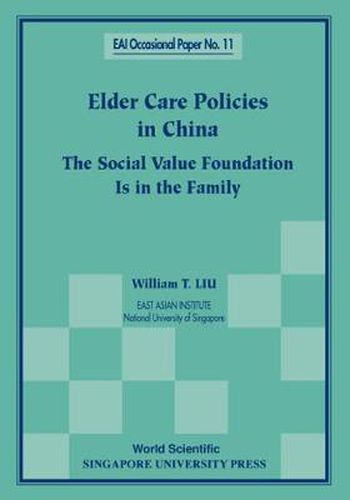Readings Newsletter
Become a Readings Member to make your shopping experience even easier.
Sign in or sign up for free!
You’re not far away from qualifying for FREE standard shipping within Australia
You’ve qualified for FREE standard shipping within Australia
The cart is loading…






If modernization means mass longevity, it raises hopes that everyone may enjoy a full span of years. It also brings the fear that many will not be able to take care of themselves and will rely upon society to provide special care. Modernization in this sense also means the rise of the welfare state: let the government take care of the frail and the old. Mass ageing has proven to be a financial crisis for welfare states in the advanced economies of the West; it also raises questions about the future of family-based care in the East while professionals and academicians in the advanced economies of the West continue to debate about whose responsibility it is to take care of the elders (the state or the individual?), governments in East Asia hold firmly to the position that it is the family that has the primary responsibility to take care of old members, and that the government’s role is to assist families in discharging elder care responsibilities. This publication examines some of the often-raised questions identified in the research literature in the last 25 years - for example, the nature and scope of caregiving, the issue of care burden, and the claim that family-based care is really women care that is sex-biased. The author marshals evidence to show from studies conducted in China that care burden is a complex form of social relations that is shaped by the culture. Furthermore, the gender and type of relations may largely determine in what type of kin relations are the subjective feelings the greatest and where objective indications of burden may remain constant. In conclusion, the author suggests that the best common resolution for both the East and the West is to establish a workable partnership betwen the state and the family in facing the forthcoming crisis of elder care in a fully-aged society.
$9.00 standard shipping within Australia
FREE standard shipping within Australia for orders over $100.00
Express & International shipping calculated at checkout
If modernization means mass longevity, it raises hopes that everyone may enjoy a full span of years. It also brings the fear that many will not be able to take care of themselves and will rely upon society to provide special care. Modernization in this sense also means the rise of the welfare state: let the government take care of the frail and the old. Mass ageing has proven to be a financial crisis for welfare states in the advanced economies of the West; it also raises questions about the future of family-based care in the East while professionals and academicians in the advanced economies of the West continue to debate about whose responsibility it is to take care of the elders (the state or the individual?), governments in East Asia hold firmly to the position that it is the family that has the primary responsibility to take care of old members, and that the government’s role is to assist families in discharging elder care responsibilities. This publication examines some of the often-raised questions identified in the research literature in the last 25 years - for example, the nature and scope of caregiving, the issue of care burden, and the claim that family-based care is really women care that is sex-biased. The author marshals evidence to show from studies conducted in China that care burden is a complex form of social relations that is shaped by the culture. Furthermore, the gender and type of relations may largely determine in what type of kin relations are the subjective feelings the greatest and where objective indications of burden may remain constant. In conclusion, the author suggests that the best common resolution for both the East and the West is to establish a workable partnership betwen the state and the family in facing the forthcoming crisis of elder care in a fully-aged society.